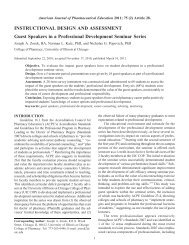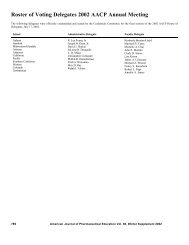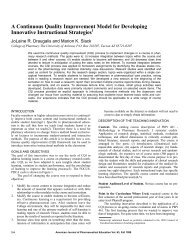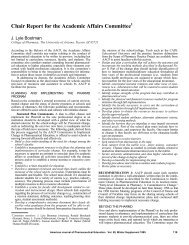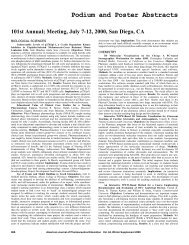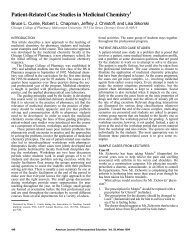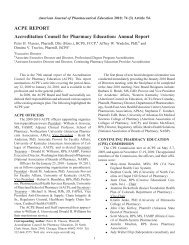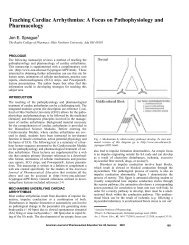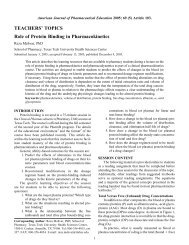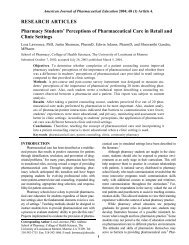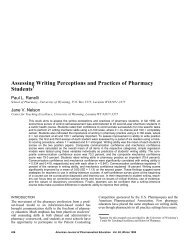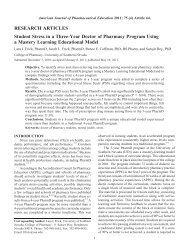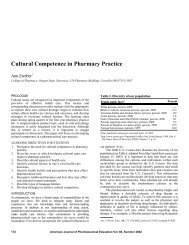RESEARCH ARTICLES Pharmacy Students' Attitudes Toward a ...
RESEARCH ARTICLES Pharmacy Students' Attitudes Toward a ...
RESEARCH ARTICLES Pharmacy Students' Attitudes Toward a ...
You also want an ePaper? Increase the reach of your titles
YUMPU automatically turns print PDFs into web optimized ePapers that Google loves.
American Journal of Pharmaceutical Education 2009; 73 (7) Article 134.<br />
implementation of public health programs in the future.<br />
To that end, plans are being made to modify the course to<br />
allow for implementation of the programs developed by<br />
students. Currently, faculty members are exploring the<br />
possibility for developing a service-learning component<br />
for the course. The service-learning component would<br />
enable pharmacy students to develop and implement<br />
community-based health education and disease prevention<br />
programs in nursing homes, homeless shelters, and<br />
schools, and measure the outcomes from the programs.<br />
Given the large number of students (over 200) enrolled in<br />
the course, the task of assigning students to different sites<br />
will be challenging. Nonetheless, the potential benefit to<br />
pharmacy students, people in the targeted communities,<br />
and society overall will be tremendous and a step toward<br />
fulfilling the mission of pharmacy in public health.<br />
Several limitations are associated with this study.<br />
First, this study was conducted in a single school of pharmacy<br />
at a private university that caters to a diverse ethnic<br />
group of students in a large metropolitan city. Thus, generalization<br />
of study findings is limited. Second, the course<br />
described in the study was developed using the public<br />
6<br />
health-related concepts outlined in the Clinical Prevention<br />
and Population Health Framework for Health Professions<br />
developed by the Healthy People Curriculum<br />
Task Force 14 and based on the endpoints outlined in the<br />
AACP Supplemental outcomes for SAS. 8 Courses not<br />
based on these concepts may yield differential responses.<br />
Third, social desirability bias induced by the survey<br />
methods may be partially responsible for the overall positivity<br />
displayed in student responses. A non-personal forum<br />
(WebCT by Blackboard, Washington DC) was used<br />
to reduce this bias. Fourth, the data collected for the study<br />
was only quantitative in nature. Qualitative data would<br />
have provided more insights into areas of the course that<br />
could be improved. Finally, this is the first study to use the<br />
adjective rating scale in pharmacy. While it has been<br />
validated in nursing studies, future studies need to examine<br />
the validity of the adjective rating scale for assessing<br />
pharmacy students’ attitudes.<br />
CONCLUSION<br />
<strong>Pharmacy</strong> students have a positive attitude towards<br />
public health-related concepts being taught in a required



